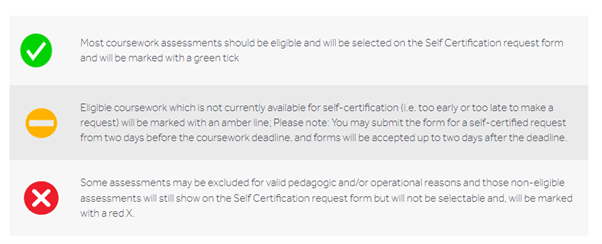Self-Certification questions
While it is best to submit assessments on time and move forward with new tasks, we recognise that students face many demands on their time. Our new self-certified short extension approach provides built in flexibility that empowers students to manage these pressures without compromising deadlines.
You can now request a seven-calendar-day extension without providing supporting evidence. It is automatically approved, with no overall limit—though only one extension is allowed per assessment and not for resits or reassessments.
Assessments will be available to select for extensions on the self-certification request form from two calendar days prior to the original coursework submission deadline and until two calendar days afterwards.
Please note: The self-certified short extensions option is not available for every type of assessment and can only be used for seven calendar day extension for eligible coursework. Please read the Self-Certified short extensions FAQs below for further details on how and on what timescales you can submit a self-certification request, and what assessments fall in scope for self-certification. If the assessment you are wanting to apply a self-certification for is not in scope for self-certification you will need to submit either a standard AA (for relevant coursework) or PREC for exams request as applicable.
The Frequently Asked Questions (FAQs) below explain a number of important aspects relating to Self-Certified short extension requests:

